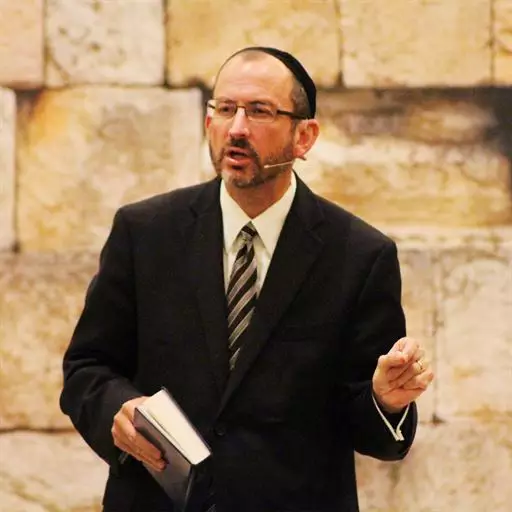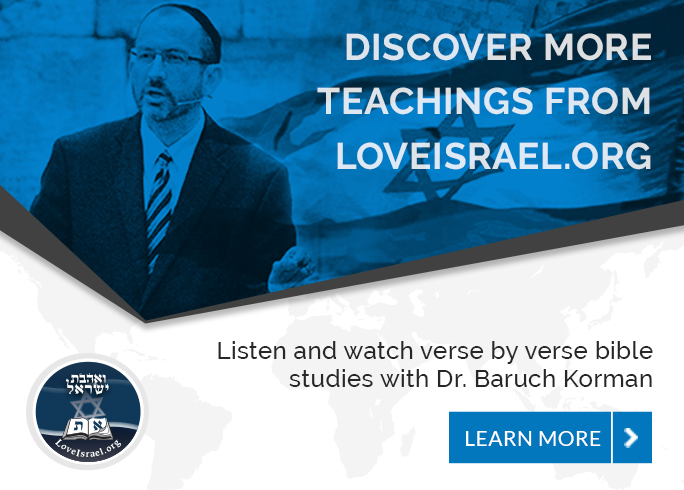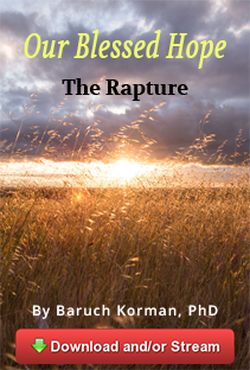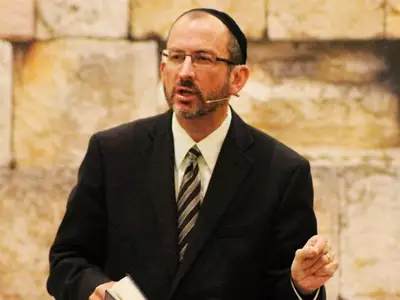Speaker 1
Shalom. And welcome to Via Hafta Yisrael, a Hebrew phrase which means, you shall love Israel. We hope you'll stay with us for the next 30 minutes as our teacher, Dr. Baruch, shares his expository teaching from the Bible.
Dr. Baruch is the senior lecturer at the Zarah Avraham Institute, based in Israel. Although all courses are taught in Hebrew at the institute, Dr. Baruch is pleased to share this weekly address in English.
To find out more about our work in Israel, please visit us on the web at loveisrael.org—that's one word, loveisrael.org.
Now here's Baruch with today's lesson.
Speaker 2
Today we begin another chapter in the book of Luke, chapter 22. And with this new chapter, we also have a new subject. We are going to be speaking about the feast of unleavened bread, which is also known in a general sense with the term Passover. Now, hopefully you'll remember that in the previous chapter, there was an emphasis on the end times. And we find that the objective of the end times is a transition out of this world and into the kingdom of God. The only way that we can make it out of this world and into the kingdom of God is through redemption.
We see that Passover, that one day, is known as the festival of redemption. It is through the blood of that lamb, that Passover lamb, that one is redeemed. With that redemption comes a new identity and also a new location. Through the blood of the true Passover lamb, and of course, I'm speaking of Messiah, Yeshua, Jesus of Nazareth, we can find eternal redemption. This means that we become a new creation, identified with that new identity as being part of God's eternal family.
What is that new location for us? No longer are we residents of this world and citizens, but as the scripture says, we become foreigners and aliens in this world because our citizenship, our place of eternal residence, will be in the new Jerusalem, speaking about the kingdom of God. So with that said, take out your Bible and look there with me to the book of Luke, chapter 22. We will begin in verse one, where it says, "But the feast of unleavened bread."
Now, the feast of unleavened bread is seven days. It begins on the 15th day of that first month, and for seven days, there is no eating of anything that is leaven. We find that the day before that 15th day of that first month is known as Passover. In a very specific way, Passover is just one day. It's also known in the Gospels as the day of preparation, where the lamb is prepared to be partaken of on the first day of unleavened bread.
What may be strange to many of you is this: technically, we don't eat the Passover on Passover. We prepare the Passover on Passover, but we eat it on the first day of unleavened bread. So look, if you would, to verse one where it says, "But the feast of unleavened bread drew near, the one that's called the Passover." When Passover comes, something should come into our mind, and that is death.
Why do I say that? Because if we look at the first Passover in Egypt, death visited every home. But there was a choice. If you killed the Passover lamb, that you sacrificed it and dealt with the blood properly, then death came to that Passover lamb. The punishment would pass over that home. What was the punishment? The death of the firstborn. If a family kept the Passover, death was the death of that lamb. If they did not kill the Passover lamb, what would happen? Then the firstborn would die, both of that family, the firstborn male, and also we see that the firstborn of the animals. So death visited everyone's house.
Notice what we see here. In verse one, we read, "And the feast of unleavened bread drew near, the one that's called the Passover." What happens? The high priests and the scribes were seeking how to put him to death for the fear of the people. What we see here is this: they wanted to put him to death. He knew. He had spoken to his disciples that Passover is coming, and he was going up to Jerusalem, not just to keep the Passover and the feast of unleavened bread, but that he was going to be betrayed, that he was going to be put to death. But on the third day, he would rise again.
That resurrection relates to a kingdom reality. In the scripture, when we come across that term, resurrection, we should think of the kingdom of God. It's only through resurrection that one can enter into the kingdom. One is going to be resurrected for a kingdom purpose only through redemption, the redemption that comes through the blood of the Lamb. We are speaking about the Lamb of God, specifically our Lord and Savior, Messiah, Yeshua.
In this scripture, the leadership, as it says here, the high priests and the scribes, were seeking how to put him to death. But notice, it was for the fear of the people. These leaders were concerned about the people.
Speaker 3
Why?
Speaker 2
Because Yeshua was popular with the people, they heard about how he raised Lazarus from the dead. They knew of the miracles that he had performed, his teachings, and that he was not simply an ordinary man, but was sent by God to teach the truth of the kingdom of God and then move on. Notice what it says: the leadership were fearful of the people.
And therefore, in verse 3, we read, "But Satan entered into Judas, the one being called Iscariot, being from the number of the twelve." Now, what we see here is this: Satan is at work in one specific individual, Judas. We know Judas is not a true believer; in fact, we see in the Scripture that he is likened to Satan. Because of his love of money, he wasn't committed to Christ but to himself. He stole from the money that was given to the disciples for his own purposes. He was not faithful at all.
Therefore, we read that Satan entered into Judas, and notice what it says in this scripture. We read that he went, being part of the twelve, one of the disciples. It says in verse 4, "And after going away, he spoke with the high priests and, who else? With the leaders of the temple." The term here refers to those who were in charge of the temple area. He went to the high priests, who served at the temple, and also to those who had power. The leadership had at their disposal Roman soldiers to carry out securely the things they wanted to do.
So he spoke to the high priests and also to the members of the temple guard about how he would deliver Yeshua to them. That's what they were looking for: a way to arrest him not in the midst of a large crowd, because he was popular, but when Yeshua was alone. Perhaps Judas would be able to orchestrate his arrest and bring him before the Sanhedrin. That is what this is speaking of.
Look now to verse 5. They rejoiced when Judas approached them with this offer, this plan that came from Satan. It says here they rejoiced and agreed with him to give money. The word here, money, is literally the word silver, and we know from other places that he was given 30 pieces of silver.
Look now to verse 6. "And he promised and was seeking a good time." Now, this is a very odd phrase, "a good time." This is a sinful, evil act, and Satan is part of it. But God is sovereign. What I mean by that is this: God is free to use whatever in order that his purposes might be fulfilled.
Now we see something here. We need to understand theology properly. Judas was a pawn or a servant of Satan. Satan entered into him; Satan doesn't enter into believers. But Satan entered into Judas, and we see that Judas was used. Wasn't God part of this? Now, can God use this for his purposes? Of course. He's sovereign, but he was not the cause of this.
Messiah came to bring about redemption through faith, and it was because of the world's rejection—both Jewish leadership and Roman leadership, which represents the world—that Messiah died. But God used that rejection to bring about redemption for the people. So it says in this scripture, he promised and sought a good time, a time that God would use for his purposes to deliver him to them without notice, without the crowd.
Why again is the scripture emphasizing that even at this late time in Yeshua's ministry, he was still very popular? We will see something later on in the trial before the Sanhedrin: they were seeking false witnesses. Notice that no false witnesses came from those who were in Jerusalem at this time. It was one of the three festivals that every religious man had to go up to Israel, specifically to Jerusalem, to keep the festival. Initially, no witnesses came forward. Finally, it says that false witnesses went forward.
What does that mean? It means people who shouldn't be able to testify before the Sanhedrin. Because no godly Jew—one who feared the Lord and believed in the law of Moses—would testify against Yeshua, they had to get false witnesses, people who should never be allowed to testify before the Sanhedrin. All of this shows the corruption of the Sanhedrin, the impurity of the leadership, and how they were not even committed to their protocol regarding this trial.
Move on to verse 7. "But the day of unleavened bread came." Now notice it's the first day of unleavened bread that is being spoken of here. What I want you to see is this: it was necessary to sacrifice the Passover. The first day of unleavened bread had come, meaning it was near, it was arriving. What had to be done on the day before? Just what we read: this is when the Passover lamb had to be sacrificed.
Speaker 3
Why?
Speaker 2
Because one partakes of that Passover lamb on the first day of unleavened bread. So this is what the scripture is telling us, that the first day of unleavened bread has drawn near. And therefore the Passover must be sacrificed.
And what happens? Look at verse eight. And he sent. Who sent? Yeshua. He sent Peter and John, having said, go and prepare for us the Passover in order that we should eat.
Now, what's important here is the word that's used. Again, you miss out so much if you don't pay attention to the original language. Now, normally in Greek, when we speak about eating something, we use the word aesthete. It is the word that is used to describe human consumption of food. This is not that word. This is a different word. It comes from the Greek word fago, and fago has a very different nuance attached to it.
Speaker 3
Why?
Speaker 2
Well, normally when the term "fago" is used in ancient Greek, it doesn't refer to human consumption, meaning humans eating, but animals. Animals eat for a very different reason. They eat for survival.
But humans, we eat because of fellowship. We eat when there is an event. We eat even if we're not hungry. We sometimes still partake of refreshments and such in order to perhaps celebrate something or simply to share fellowship with an additional person.
So here the word "fago" is used.
Speaker 3
Why?
Speaker 2
To show dependence. It is absolutely necessary that one partakes of this Passover, because Passover, we've already said, is the festival of redemption. And therefore we need this redemption desperately. We are dependent upon this redemption. So it says here that he sent both Peter and John, saying, go and prepare. Notice this for us the Passover, in order that we should eat.
Verse 9. But they said to him, where do you want that we should prepare? Verse 10. But he said to them, behold, after entering into the city, meaning after you both enter into the city, you will meet a man carrying a water jar. Now, this would have been a large jug of water. And Yeshua, who knows all things, he's speaking and says, when you come into that city, you're going to see an individual carrying this large jar or pitcher of water. And it says, keep reading. In verse 10, you follow him into the house which he is entering.
Verse 11. Now, in verse 11, Yeshua is speaking, and he says, and you are to say to the master of the house, what are they to say? They are to tell him, saying to you, the teacher. Now he's speaking about what these two disciples, Peter and John, are supposed to say to this man who enters into the house carrying this large pitcher of water. They are to say, the teacher, referring to Yeshua himself. The teacher says to you, where is the upper room? Meaning that guest quarter where the Passover, that I will eat with my disciples.
So Yeshua is saying to Peter and John, you're going to meet a man. He knows already that he's going to be carrying this large pitcher of water. And he says, you follow him into the house, and you say to him that the teacher, referring to Messiah, Yeshua, Jesus Christ, he wants to know, where is that upper room? In order that he can eat with his disciples this Passover.
Verse 12. And that one will show to you an upper room. And not just any upper room, but a large upper room that is furnished, meaning it's all prepared there. You shall make ready those final, final arrangements. Verse 13. And going away, what did the disciples do? These two, Peter and John, they obeyed. That's what disciples do. We hear and we obey. It says, but after going away, they found it, just as he said to them. And what did they do? And they prepared the Passover.
Now, again, it's very important that we understand what Messiah and this scripture is teaching us. There is redemption. What's redemption? The Passover and redemption through the blood of the Lamb. We see over and over, for example, in the book of Revelation that Yeshua is the Lamb of God slain before the foundations of the world. Meaning this God knows all things. And God knew that Yeshua was going to be sent into this world because God sent him into this world in order that he purchased for us through his own blood, eternal redemption.
And when would he do that? On Passover. It's so important that people understand that Messiah died upon that cross on Passover. He did so in order to purchase for us this eternal redemption. Now notice, Passover is one day, the 14th day of the first month. And it is known as the preparation day. For what? In order to observe the feast of unleavened bread.
And the feast of unleavened bread. Unleavenedness relates to sinlessness. Leaven relates to sin and pride. That which is unleavened speaks of purity, an absence of pride and absence of selfishness. And what we find is this Messiah is the perfect example, being the Passover lamb, but also being the one who was prepared for us that we might truly observe the feast of unleavened bread.
And what do I mean by that? Well, unleavenedness has to do with humility, the absence of pride and selfishness. And through that which is unleavened, God uses do a good study of what took place in the temple. And we find that in the temple everything was unleavened. Why? Being unleavened is necessary for the sake of worshiping God. And redemption prepares us to worship God. Without redemption, it is impossible to worship God, impossible to enter into his presence, and possible to become his kingdom people.
So redemption is necessary. And Messiah. Remember what John the Baptist said when he first saw Yeshua? He says, behold the lamb of God, meaning the one that God provided, the one that God sent into this world in order that. What does he say? Behold the lamb of God who takes away the sins of the world. That's what Messiah does. Through his death on Passover, through his work of redemption, we find sins being removed.
And through that act of redemption, not only are our sins removed, but we also know through that new covenant that all of our sins are forgotten, forgiven and forgotten. And there is nothing that comes between us and God. Through redemption, we can have eternal intimacy with God. We can be in his presence, and we will be in his presence in the kingdom of God.
So in the same way that the children of Israel came out of Egypt, Egypt, as I've said many times, is symbolic of the world. So Israel came out of Egypt. And with Israel, meaning the children of Israel, were also that mixed multitude of various nations. They also, through faith, kept the Passover. And the children of Israel and that mixed multitude, they came out. They were in that wilderness, that desert, for 40 years. And the number 40 relates to transition and change. When the 40 years had come to a conclusion, the people were different.
Speaker 3
Why?
Speaker 2
That disobedient generation had died out. But there was a new generation, that next generation. And they were the ones that God brought into the land of Israel.
And what was the first thing they did? They celebrated Passover at Gilgal. Why Gilgal? Gilgal is a word which means to roll away. And that's what God does. He rolls away our condition of being uncircumcised and we become circumcised, not just outwardly, but inwardly our hearts, so that we think differently, we behave differently, and we are a new creation through redemption that comes only through the blood of the Lamb of God, our Lord and Savior, Messiah.
Yeshua, we're going to see in the weeks to come how everything that was done in order to bring us into eternal intimacy with God and allow us to spend eternity in the Kingdom of God. It all comes to us within a context of Passover and the Feast of Unleavened Bread to teach us. Indeed, it is Yeshua who is that Lamb of God who was sent into this world in order to lay down his life.
Speaker 3
Why?
Speaker 2
So that we could have eternal life. That we through his life, which was a perfect life, could be transformed and the righteousness of the Son could be imparted to us, that we would be welcomed into the Kingdom of God whereby we would know the glory of God, the intimacy with God, and the blessings and the promises of God. This is who our God is.
And it's only possible to understand God's provision when we rightly understand this Preparation Day Passover and the seven days that follow. Seven relates to the purpose of God, and what is his purpose? To bring you into an eternal relationship with him by faith, through believing in the Lamb of God who shed his blood so that you could experience everlasting life in His Kingdom.
I'll close with that. Shalom.
Speaker 1
Well, we hope you will benefit from today's message and share it with others. Please plan to join us each week at this time and on this channel for our broadcast of LoveIsrael.org again.
To find out more about us, please visit our website LoveIsrael.org. There you will find articles and numerous other lectures by Baruch. These teachings are in video form. You may download them or watch them in streaming video.
Until next week, may the Lord bless you in our Messiah Yeshua, that is Jesus, as you walk with Him. Shalom from Israel.

 Learn How
Learn How






